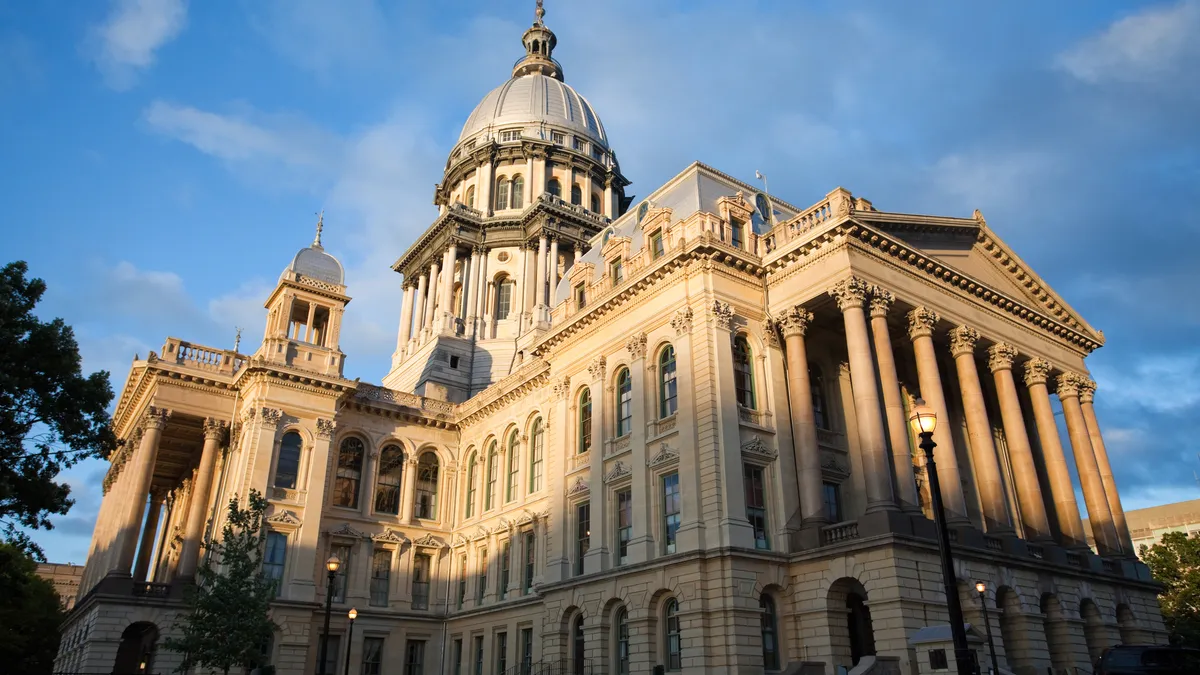The Illinois state legislature last week passed a revenue bill that would prohibit card issuers and card networks from imposing interchange fees related to excise taxes and tips on consumer tabs.
The legislation, sponsored by Democrats, would establish the Interchange Fee Prohibition Act for both credit and debit card payments. Interchange fees, also known as swipe fees, are paid by businesses that accept customer payments by card.
A spokesperson for Illinois Gov. J.B. Pritzker, a Democrat, said by email this week that she expects the governor will sign the bill into law by the end of this month after it lands on his desk.
That new law would bar “a payment card network, an acquirer bank, or a processor” from receiving or charging fees on the tax amount or the gratuity associated with the sale of goods and services, according to the legislature’s summary of the bill.
The restriction would be contingent on the merchant informing the bank acquirer accepting the payment of the tax and gratuity amounts as part of the authorization or settlement of the electronic payment, the legislation said.
Other states, including Texas and Florida, have been considering such bills, but the Illinois legislature is the first to pass such legislation, according to National Association of Convenience Stores General Counsel Doug Kantor, who has been tracking bills on the topic. Driving the trend is a realization that businesses shouldn’t have to reach into their own pockets to pay the swipe fees when they’re collecting money on behalf of others, he said.
“There’s a recognition that there’s a very fundamental unfairness going on here: The actual tax dollars that merchants are collecting on behalf of the state are being taken away by the credit card companies,” Kantor said in an interview Friday. “It’s like they’re being penalized for helping out the state in collecting taxes.”
That principle holds true with respect workers’ tips as well, he said. Merchants run the risk of upsetting employees and customers if they don’t pass all of the tip to workers, but conversely they’ll need to debit themselves if they don’t take the fees out of the gratuity, he said.
U.S. Sen. Dick Durbin, a Democrat from Illinois, applauded the state legislature’s move in a press release last week, saying it would “curb the outrageous swipe fees on electronic transactions.” Durbin has been pushing a bill in Congress, the Credit Card Competition Act, that also seeks to rein in interchange fees.
Kantor is also executive committee member of the Merchants Payments Coalition, which is one of the merchant trade groups that have backed the CCCA proposal. By contrast, interest groups representing the banks that issue credit cards, and their credit card network partners, such as Visa and Mastercard, have opposed the bill.
The House bill, HB 4951, passed that chamber on a 60-47 vote last week, while it passed the Senate earlier in the week on a 37-22 vote. The revenue bill included a host of other legislative items and was split along party lines, supported only by Democrats.
Under the interchange prohibition bill, any entity involved in receiving fees on the tax or gratuity would be subject to a civil penalty of $1,000 per transaction and would be required to refund the fees, according to the text of the bill.
The law also proscribes the card companies from manipulating the calculation of their fees to increase the rate elsewhere in an attempt to circumvent the impact of the law.
ABA Banking Journal reported on the new law last week, also calling it out as the first such law in the U.S., saying it’s scheduled to take effect July 25 of next year. The bill may have been a last-minute addition to appease merchants upset by the governor’s signing of a budget last week that capped a discount retailers receive on sales tax, the Journal reported.











